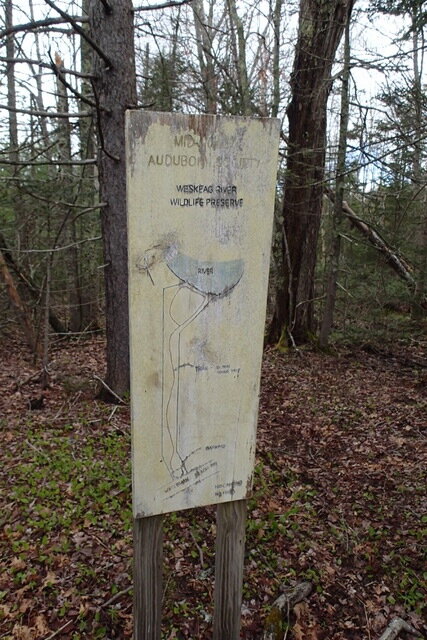Our volunteer group was formed out of a shared profound respect for nature and
a desire to inform on, alleviate and remedy negative impacts on our local environment
so everyone can discover and enjoy it.
We meet about once a month and participate in a variety of projects described below.
All are welcome!
For more information please email STCC at gmail.
Weskeag River Monitoring:
Taking a sample of the ‘Keag River
In this photo are three members of our group collecting data about the temperature, salinity and dissolved oxygen of the Weskeag River as it flows under the Rt 73 bridge. Some water samples are also tested for bacteria. Before reaching the bridge, the Weskeag flows through a rich, thriving salt marsh. Salt marshes are valuable nurseries for juvenile marine fishes and migratory birds. This program seeks to monitor the quality of these beautiful waters with biweekly sampling of the river and its main tributaries. This work by local volunteers is supported and overseen by the State of Maine DEP in Augusta and is in its fourth summer of sampling. We look forward to sharing results with the residents of South Thomaston in the fall when our current sampling season is completed.
Tide Monitoring:
Sensor installed at Merchant’s Dock
The sea, with its exceptional tides and storm surge has always been of concern to South Thomaston. Questions such as how high are the king tides and how often do they inundate our shores, roads, docks, bridges and the infrastructure of our coastal town are critical to current and future management and mitigation.
Recently, the Storm Surge Project of the University of Maine at Orono has generously provided our group with two long term underwater sensors to establish a needed baseline to record these high waters. Our group will download these sensors monthly. The collected information will be made available to the town after it is analyzed by University of Maine staff.
Trail Restoration & Mapping:
A quick inventory of existing trails in town, developed by the Audubon Society or other organizations, revealed that most of them are in need of maintenance, thereby offering opportunities for community service.
Given the prevalence of green spaces within the town lines we intend to explore new possibilities for recreational trails and preserves with a keen eye towards protecting important habitats. We will assist in their development and maintenance.
Lastly, we will create downloadable maps and resource links for our residents, so they will have every opportunity to get out and enjoy the beautiful place we call home.
Litter Prevention and Recycling:
As proud residents of South Thomaston we lament the litter defacing the road sides and our shared public spaces. We are researching trash receptacles that would help people make the right decision about trash disposal, in order to achieve our twin goals of cleanliness and maximum recycling of glass and plastic.
Plastic containers imperil our waters and marine life, and it is important to raise our collective responsibility to protect them. Initially we aim to address the situation at the Town Landing, as it is the most used common space in our town.
Municipal Carbon Footprint Reduction:
Fiscal responsibility and responsible stewardship of our environment are not mutually exclusive as more and more communities are demonstrating. Our town is already engaged on that path through the adoption of cost saving technologies such as LED street lighting, Further progress can be achieved by switching to renewable energy, such as solar, to supply South Thomaston’ s energy needs - current and anticipated.
We are eager to assist the town in any way possible.
Airport Advisory Committee:
Our efforts include a focus on the Knox County Regional Airport. The APAC, the Airport Public Advisory Committee, is a 10-person group providing a link between mid-coast communities, the airport manager, and the County. One of the seats specifically addresses environmental initiatives and concerns and is currently held by one of our members.
The challenge is to develop, maintain, and upgrade the airport and its operation strategies in the greenest way possible. Pivotal issues are reducing carbon emissions via solar and wind power, using surfaces that reflect heat from the airport building and repaving when needed with environmentally friendly asphalt, incorporating recycled and natural materials in the infrastructure, decreasing noise pollution from aircraft takeoffs and landings, and treating - but ideally preventing - contaminated water, possibly emanating from aircraft fueling and maintenance, de-icing activities and/or ground support equipment, from flowing elsewhere. Our group is also concerned about the protection of aquatic ecosystems such as wetlands, streams and rivers, and estuaries.
Looking Ahead:
This is an ambitious program requiring motivation, dedication, many hours and other resources. We are currently a 100% volunteer group, self-financing current expenses such as lab testing, preliminary map printing, etc. Large grants are available from the state of Maine to support efforts such as ours. In order to apply for such support, the town must first approve the creation of a Conservation Commission.
Our hope is that the creation of a Conservation Commission will be approved at our next town meeting. For more information on the purpose and operations of the Conservation Commission please visit BeginningWithHabitat.org. This site has been an essential guide. To quote directly from the site; “Conservation Commissions function as the natural resource planning body in town and act in a consulting role to town staff, elected officials, and other local communities.”






